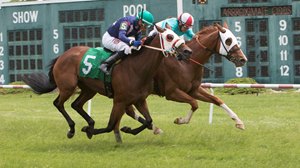Racing's Return to Massachusetts Moves One Step Closer


The long-hoped-for return of Thoroughbred racing to New England will become reality next year now that Commonwealth Equine and Agricultural Center has submitted its formal application for 2023 live racing dates to the Massachusetts Gaming Commission.
The partnership, headed by Richard Fields, the principal of Sterling Suffolk Racecourse, which operated Suffolk Downs, and breeder and owner Robin Kalaidjian, filed the application for two days of racing Sept. 30.
The MGC's annual application deadline is Oct. 1, and the commissioners are expected to rule favorably on the request as early as possible.
The last live Thoroughbred race in Massachusetts was on June 30, 2019, at Suffolk Downs, which hosted abbreviated meets of four to eight days from 2015 to that time. In May 2017 Fields and his Sterling Suffolk Racecourse sold Suffolk Downs to a major Boston real estate development company and demolition began on the backside on July 1, 2019.
Commonwealth Equine and Agricultural Center's application requests a total of two live dates on Sept. 9-10, 2023. Those dates fill the blank on the calendar between the end of the annual Saratoga Race Course meet and the beginning of the fall meet at Belmont Park, which is currently being run at Aqueduct Racetrack due to ongoing construction at Belmont.
"We realize it's two days only, and that's not ideal for everybody, but it's a start. It's something we can build upon," said Paul Umbrello, executive director of the New England affiliate of the Horsemen's Benevolent & Protective Association.
Fields and his partners are securing the 360-acre Meadowbrook Farm in Hardwick, Mass., for the site of the yet unnamed new racetrack. The act of purchasing a suitable parcel of land and at the same time being welcomed by the local townsfolk is something that had eluded the New England horsemen for almost a decade. They have suffered through years of crushing disappointments while witnessing no fewer than 10 proposals to build a new racetrack in Massachusetts go down in flames.

"For eight years it's been very tough to find the right piece of land that's suitable and the town to work together to get a new track built. We could find one, but then not the other," said Umbrello. "Over those eight years we've been scratched in the post parade many times. It's only two days to start, but I'd rather be in the starting gate with the chance to finish the race than be scratched."
The new racetrack will have a one-mile turf course only, and there will be temporary barns to accommodate the horsemen who ship in for the two days of racing. To start, purses for each day will be set at $750,000 and there will be a stakes race written to highlight each card.
The return of live racing, which was made possible when Massachusetts this past summer passed a sports betting bill that guarantees the racetrack license holders a sports betting license, has far-ranging implications.
The program will be a big shot in the arm for the Massachusetts Thoroughbred breeding industry, which has fallen on hard times over the years. There was only a single foal registered in the Bay State last year.
Fields said that in addition to the live dates the racetrack property will be used to support the breeders and aftercare. Quality mares will be boarded and stallions will stand on the property to revive the program. The farm will also be a lush retirement home for horses who have ended their careers on the track.
Moreover, the return of live racing means that the horsemen will now have greater access to their share of the Massachusetts Race Horse Development Fund, which at last count totaled $25 million and is being escrowed.
The RHDF was established in the state's 2011 expanded gaming law to help the struggling Thoroughbred and harness industries in the face of casino competition. Under state statute, a percentage of the revenue from the full casinos and slots machine facility fuels it, with 80% of the money supporting purses, 16% going to breeders, and 4% directed to backstretch welfare.
In 2014, the MGC's subcommittee named the Horse Racing Committee decreed the overall split of the RHDF to be 75%-$25%, Thoroughbred to Standardbred. But over the ensuing years, the HRC has continuously whittled down the Thoroughbred horsemen's share so that now the harness horsemen get 92% of the money for purses, 70% for breeders, and the cut for welfare is split 50%-50% between the two breeds.
Over the years that Massachusetts has lacked a vibrant Thoroughbred industry there have been repeated calls by the public and state legislators to strip a large portion of the horsemen's share of the money and redirect it into the state's general fund.
Without the restoration of live racing time was running out for the horsemen, and even a two-day meet will now help them keep their money in their pockets.
"We have hundreds of trainers who every day rely on us for benevolence, life insurance, old age assistance, and other benefits. Without that Race Horse Development Fund, that money will be gone. I understand that two days of live racing isn't ideal, but it's a start. We intend to build on that. Continuing the benefits and keeping the Massachusetts breeding industry going is as important as bringing back racing," Umbrello said.
The NEHBPA and the Commonwealth Equine and Agricultural Center group have a purse agreement in place and are solidifying plans for the 2023 meet.
"It's going to be spectacular," Fields earlier told the BloodHorse. "With the legislation, the selection of the right community, putting together the right plan and the right team, I do think it's a new era, and we're all looking forward to it."
